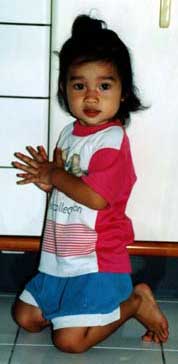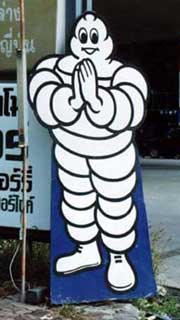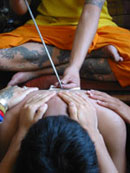What is a 'wai'?
The ‘wai’ (pronounced like the word ‘why’) is the traditional greeting in Thailand. The ‘wai’ originated as a way of people showing each other they were not carrying weapons but has evolved greatly over time.
The ‘wai’ is not just a simple friendly hello or goodbye. As a general guideline, you press you palms and fingers together and raise them to nose level with a slight bowing of your head. The ‘wai’ is one of the most difficult things to learn how to do correctly in Thailand.
It is given at different heights, meaning sometimes your fingertips meet the level of your forehead and sometimes they meet the level of your chin. The higher your fingers are, the more respect you are giving. The ‘wai’ is filled with meaning and is hard for outsiders not used to Thailand’s clearly defined systems of rank and order to figure out.
The height of the ‘wai’ is determined by many factors relating to status: the outward appearance, age, job, position, education, and the social connections of the person you are greeting should all determine the height of the ‘wai’ given. The ‘inferior’ person ‘wais’ first and the appropriate greeting or no greeting at all is returned. The highest and most respectful ‘wai’ is reserved for His Majesty the King, The Royal Family, the Lord Buddha, and monks.
connections of the person you are greeting should all determine the height of the ‘wai’ given. The ‘inferior’ person ‘wais’ first and the appropriate greeting or no greeting at all is returned. The highest and most respectful ‘wai’ is reserved for His Majesty the King, The Royal Family, the Lord Buddha, and monks.
If the social rank between two parties is extremely different, the ‘lower’ party says hello and the other does not. For example, children, waiters, waitresses, taxi drivers, and workmen ‘wai’ but do not expect a ‘wai’ back.
To ‘wai’ or not to ‘wai’ and how to ‘wai’ correctly seem to be the big questions. It is better to ‘wai’ than to not ‘wai’. As a general rule of thumb I return a ‘wai’ at the same level it was given to me unless it is clear that I should not return the greeting. If I am unsure of myself, I smile and offer a handshake. I am also certain there are many times I have just stood around looking stupid or made a mistake. Actually, the more I learn about the ‘wai’ the more hesitant I am to use it.>br>
Thais attend social skills classes throughout their schooling. They are taught as early as the age of two how to ‘wai’ properly and these skills are practiced as vigorously as the ABCs and 1,2,3s. Thais accept the fact foreigners have a hard time figuring all of this out. They graciously either defer to the handshake or leave room for mistakes. They also tend to ‘wai’ foreigners less, not to be rude, but because they know Westerners do not greet each other in this way.
about the ‘wai’ the more hesitant I am to use it.>br>
Thais attend social skills classes throughout their schooling. They are taught as early as the age of two how to ‘wai’ properly and these skills are practiced as vigorously as the ABCs and 1,2,3s. Thais accept the fact foreigners have a hard time figuring all of this out. They graciously either defer to the handshake or leave room for mistakes. They also tend to ‘wai’ foreigners less, not to be rude, but because they know Westerners do not greet each other in this way.
The ‘wai’ is mysterious in the sense that it can say everything using no words at all. The ‘wai’ is as much a part of Thailand as the handshake, the hug, or the kiss is to the West. As complicated as the ‘wai’ is for the West, all the hugging, kissing, and shaking of hands are equally bewildering for the Thai. I was recently discussing the ‘wai’ with a Thai friend. He said, “So, when you go home and see your father you shake his hand, right?” Wrong. I give him a big hug.
him a big hug.
Western greetings are just as complicated. Family members and good friends get big hugs. At a business dinner, a firm handshake will do. Sometimes the ‘high-five’ is used. When two people are forced to pretend they like each other (i.e., you and your friend’s scary new girlfriend), the ‘fake hug’ can be used. Sometimes kisses are also added. In Switzerland friends exchange three kisses on alternate cheeks. In Brazil, it is only two and to give three means you are in love with the person.
While in Thailand watching the ‘wai’ makes for an educational and interesting time. Another thing to keep your eyes open for is the Michelin Man. Ronald McDonald gives his wave. The Colonel from Kentucky Fried Chicken stands seriously. The Michelin Man is special: He sometimes gives a ‘wai’.
This traditional wooden ‘wai’-giving Michelin Man is facing the danger of extinction. He is slowly being replaced by his new and improved plastic western waving-with-the-right hand version. His tires are being revamped. He is getting fatter. He is being faded out, brought up to speed, launched into the new millennium, and sometimes he is even forced to wear glasses.
I have a ‘wai-ing’ Michelin Man down the street. To my horror one day he was flipped around exposing the bare wood on his backside. I thought he was a goner and I panicked. A week went by and every time I drove past him my heart sank. I launched a plan to head down to the gas station and try to buy him but before I could do so, my prayers were answered. They turned him back around. For me, this is part of cultural preservation.
